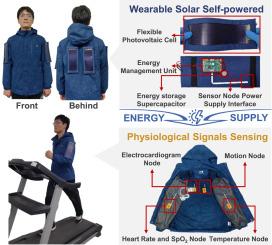具有自我维持能量管理的太阳能可穿戴生理传感系统:设计与实现
IF 7
2区 工程技术
Q1 ENERGY & FUELS
Sustainable Energy Technologies and Assessments
Pub Date : 2025-09-03
DOI:10.1016/j.seta.2025.104548
引用次数: 0
摘要
可穿戴传感器对于持续的生理监测至关重要,但其长期运行往往受到功率限制,特别是在高功率需求和设备小型化的情况下。为了克服这一挑战,本文提出了一种具有自我持续能量管理的太阳能可穿戴生理传感系统的设计、实现和评估。嵌入衣服中的柔性太阳能电池可以实现连续的能量收集,而高效的硬件架构和分阶段启动策略可以解决零能量条件下的冷启动问题。此外,在能量管理单元中集成了针对微尺度光伏系统设计的事件驱动的开路电压最大功率点跟踪控制算法,跟踪精度达到99.75%。通过协同的硬件软件协同设计,系统确保持续的正能量积累。它支持四个灵活的传感器节点,能够获取、传输和可视化五种生理信号:心电图、心率、血氧饱和度、体温和运动状态。实验结果表明,该系统在不同太阳辐照度和动态光照条件下均能保持稳定的3.3 V输出,实现了4个柔性传感器节点可靠的自供电运行。这项工作为长期、自主的可穿戴健康监测和能量优化提供了一种有前途的方法。本文章由计算机程序翻译,如有差异,请以英文原文为准。

A solar-powered wearable physiological sensing system with self-sustained energy management: Design and implementation
Wearable sensors are essential for continuous physiological monitoring, yet their long-term operation is often limited by power constraints, particularly under high power demands and device miniaturization. To overcome this challenge, this paper presents the design, implementation, and evaluation of a solar-powered wearable physiological sensing system with self-sustained energy management. Flexible solar cells embedded in clothing enable continuous energy harvesting, while an efficient hardware architecture and a staged startup strategy address cold-start issues under zero-energy conditions. Furthermore, an event-driven open-circuit voltage maximum power point tracking control algorithm, specifically designed for micro-scale photovoltaic systems, is integrated into the energy management unit, achieving a tracking accuracy of 99.75 %. Through a synergistic hardware–software co-design, the system ensures sustained positive energy accumulation. It supports four flexible sensor nodes capable of acquiring, transmitting, and visualizing five physiological signals: electrocardiogram, heart rate, blood oxygen saturation, body temperature, and motion status. Experimental results demonstrate that the system maintains a stable 3.3 V output under different solar irradiance and dynamic lighting conditions, enabling reliable self-powered operation of the four flexible sensor nodes. This work offers a promising approach for long-term, autonomous wearable health monitoring and energy optimization.
求助全文
通过发布文献求助,成功后即可免费获取论文全文。
去求助
来源期刊

Sustainable Energy Technologies and Assessments
Energy-Renewable Energy, Sustainability and the Environment
CiteScore
12.70
自引率
12.50%
发文量
1091
期刊介绍:
Encouraging a transition to a sustainable energy future is imperative for our world. Technologies that enable this shift in various sectors like transportation, heating, and power systems are of utmost importance. Sustainable Energy Technologies and Assessments welcomes papers focusing on a range of aspects and levels of technological advancements in energy generation and utilization. The aim is to reduce the negative environmental impact associated with energy production and consumption, spanning from laboratory experiments to real-world applications in the commercial sector.
 求助内容:
求助内容: 应助结果提醒方式:
应助结果提醒方式:


